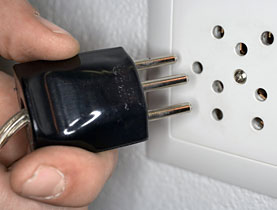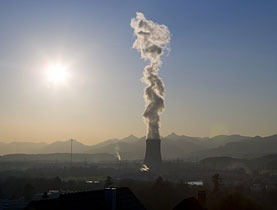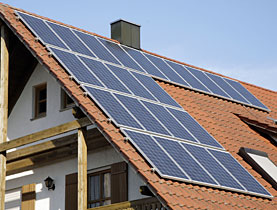Swiss eat up record amount of energy

The Swiss are a nation of energy guzzlers – figures show that electricity consumption grew to its highest level ever in 2008.
The government is already looking for new ways to generate enough power for the nation’s needs. Green campaigners are calling for energy saving measures to be speeded up.
Electricity consumption last year increased by 2.3 per cent to 58.7 billion kilowatt hours (kWh), a new record for electricity consumption in one year, according to the latest Federal Energy Office figures.
The statistics, released on April 15, also show that domestic power plants generated 1.6 per cent more electricity than in the previous year – the second-highest amount ever produced.
Energy Office spokeswoman Marianne Zünd said there were three main reasons for the consumption rise.
“First of all it’s the economy, as we had a very good economy in the first half of 2008. Then we had a quite cold first half of the year and the third factor is the number of residents which also went up in 2008,” she told swissinfo.
Boom and bust
The usage boom comes despite a government energy efficiency drive.
“We can say that the electricity consumption would be even higher if we didn’t have the programmes to save energy – it would be three to four per cent higher,” Zünd said.
The trend could continue in the future, even if the federal office expects the economic crisis to lead to a downturn in consumption this year. “It’s hard to say. If we have a recovery of the economy during this year, it could also go up again,” Zünd added.
A high consumption rate – Zünd says that Switzerland’s is quite high in Europe because of electric heating use – means that the country would have to import more electricity from its neighbours.
Switzerland uses up all the electricity that it produces domestically. Extra needs in winter are supplemented by supplies from other countries. If the consumption continues to climb, summer imports could also become a reality, Zünd says.
Nuclear question
The government is already looking at new sources of power – without discounting the old ones.
“The objective is to increase the part of renewable energies in our electricity mix. However the government said two years ago that it wouldn’t be possible to do this in the next ten to 20 years,” Zünd explained.
“So in this time we’ll need some big production plants, like nuclear power plants or gas plants to cover our electricity needs.”
The nuclear question has caused heated debate. Last month a Federal Energy Office survey revealed that more than half of the public opposed nuclear technology to some degree, despite the fact that it provides Switzerland with 40 per cent of its power.
Plans to build sites to store spent atomic fuel have also caused protests, as have official requests from Swiss electricity companies such as Atel to build new plants.
Zünd said that the discussions over building nuclear power stations would continue over the next three years and that there would be a nationwide vote on the issue.
Energy efficiency is also being boosted. New standards for electronic devices such as washing machines are being drawn up and the European Union regulation on phasing out traditional light bulbs announced last December would also be enforced in Switzerland, she said.
Wasted time
For Christian van Singer, a Green party parliamentarian, the government is not acting fast enough to stop energy waste.
“What could be done straightaway is a ban on appliances which consume too much electricity, such as bad-quality fridges or freezers,” van Singer told swissinfo, adding that this had already happened in other European countries.
Appliances on standby should also not consume more than one watt of electricity, he added. Some appliances currently consume 20 watts on standby.
“People don’t realise. They think the television is off but it’s badly constructed and it continues to consume energy,” he added.
Nuclear power, however, is not an option, said the Green parliamentarian. “It is dangerous and consumes uranium which is not renewable, and we are going to run out of it at the same time as oil,” he said.
In addition, uranium mining and transport emit carbon dioxide. “The solution therefore lies in renewable energies,” said van Singer.
swissinfo, Isobel Leybold-Johnson
Swiss electricity sources:
55% hydroelectric
40% nuclear
5% other, such as renewable energy – wind, solar and fossil fuel power
Source: Federal Energy Office
In 1990 Swiss voters approved a ten-year moratorium on new nuclear facilities. The decision came only a few years after the Chernobyl disaster and by 1998, the government had decided in principle that Switzerland would abandon nuclear power.
But at the end of the moratorium, the pro-nuclear lobby began calling for new plants, saying it would help cut production of greenhouse gases and dependency on fossil fuels.
In 2003 voters rejected two proposals, one calling for a new moratorium, another demanding the end to Swiss nuclear energy.
The nuclear energy law introduced in 2005 confirms that atomic power is not dead, but submits any new projects to a possible nationwide vote.
In February 2007 the cabinet decided to replace existing nuclear power plants and build gas plants to avoid an energy shortfall.

In compliance with the JTI standards
More: SWI swissinfo.ch certified by the Journalism Trust Initiative












You can find an overview of ongoing debates with our journalists here . Please join us!
If you want to start a conversation about a topic raised in this article or want to report factual errors, email us at english@swissinfo.ch.